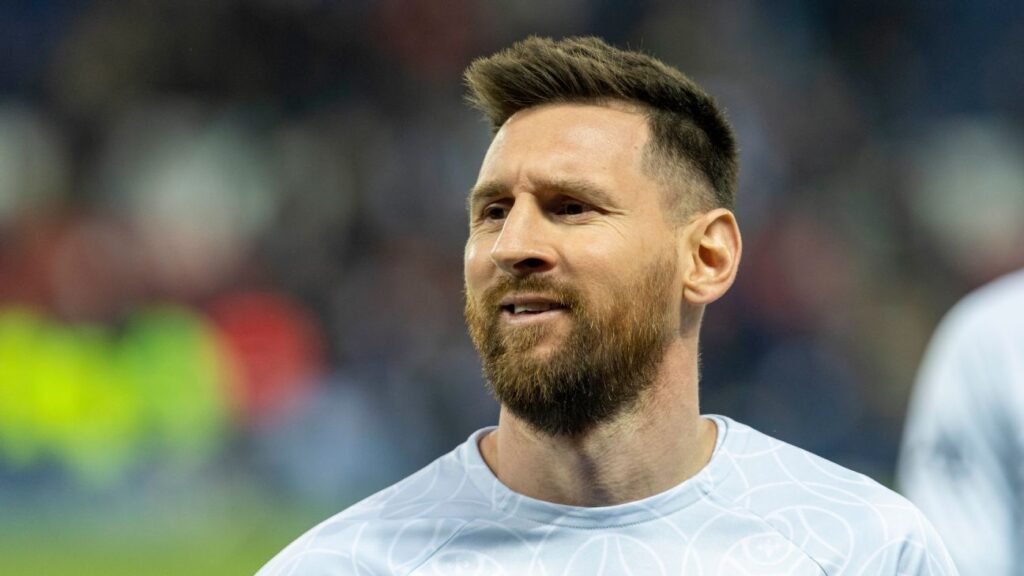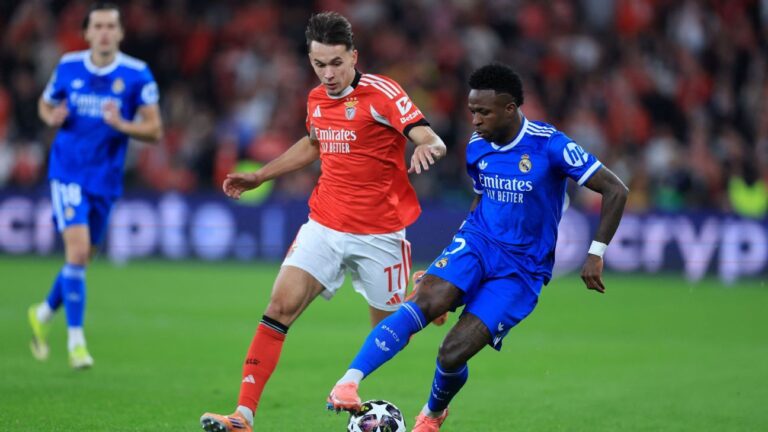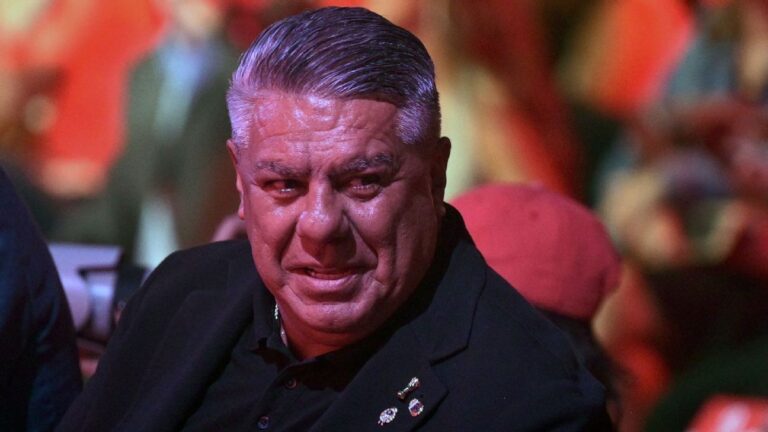Set against the backdrop of their current troubles — and you can choose whether accusations of trying to influence refereeing decisions, being in a precarious financial state or needing to abandon the Camp Nou for a couple of seasons due to renovations is the more damaging here — it would be easy to dismiss rumours of Barcelona trying to repatriate Lionel Messi as little more than useful distraction tactics to divert attention away from their increasingly bleak situation. Smoke and mirrors and Messi, if you like.
So it comes as an interesting twist in the tale to find — as I’m extremely confident is the case — that the entire idea of him re-signing for Barca is being driven by Messi himself.
As has almost always been the case, the World Cup-winning Argentina captain has the world at his feet. Paris Saint-Germain want him to renew his contract, which expires this summer, fearing the idea of being denuded by his departure. Money is no object when it comes to their overtures.
– Stream on ESPN+: LaLiga, Bundesliga, more (U.S.)
MLS side Inter Miami know that Messi has long been working on a package deal to buy significant shares in the club and, in due course, play there. Yet Messi also knows there’s now a significant sum on offer (reportedly north of $300 million) if he chooses to play in Saudi Arabia and set up another series of battles with Al Nassr’s Cristiano Ronaldo and “who’s better?” snooze-fests while the Saudis compete to host the World Cup in 2030.
But it was the 35-year-old genius, who departed Camp Nou in tears nearly two seasons ago after a flood of trophies, goals and general brilliance, who decided that his first option was to go “home.”
When current Barcelona vice-president Rafa Yuste confirmed “contact with Messi’s people” a fortnight ago, he framed his answer as if he, personally, had a thorn in his side about how things had ended. In a sense, it sounded like Yuste wanted to persuade Messi to have a Michael Jordan “Last Dance” experience because “beautiful stories should end well.” It sounded as if Barca, despite being in the middle of an almost all-consuming institutional mess, were the ones with the vision, humility and daring to try and put right the horrible, cold-hearted fracture they themselves had inflicted on the relationship between the Camp Nou club and its prodigal son.
(Just in case you’ve forgotten what happened: Back in 2021, Messi agreed to cut his salary by 50% in order to help Barcelona to renew his expiring contract, flying to Camp Nou from his holiday in Ibiza thinking a deal had been struck. Except he soon discovered that club president Joan Laporta had completely changed his position, that there was no new contract and that, in effect, Barca had unceremoniously dumped their greatest ever footballer.)
A couple of months after he gave his distraught “adios” news conference, Messi told Diario Sport about that mess. ”Nobody ever asked me to play for free,” he said. “They asked me to reduce my salary by 50%, and I agreed because I wanted to help the club — and my whole family wanted to stay in Barcelona. I was willing to do everything I could to make that possible, which is why what the president said was so hurtful.
“There was absolutely no need for it. [Laporta] threw me to the wolves without taking responsibility for his actions or considering the consequences. It raised all sorts of doubts in people’s minds, and I really believe I deserved better than that.”
Yuste’s words, so soon after Messi drove Argentina to the holy grail of winning the World Cup, made it look as if Barcelona had seen the error of their ways and were, at least, trying to make things right. But not so; instead, it emerges that Messi decided to message Xavi.
Messi reportedly told his former teammate, and fellow 2009 and 2015 Treble-winner, that his first option — if it could be sanctioned by Xavi the coach and if the club could find a financial mechanism to make it work — would be to move back to his Mediterranean mansion, where he’d test his ability to stay in shape so he could compete in the 2026 World Cup and remove the metaphorical thorn from his side.
I’m not quoting directly from Xavi’s response to Messi but I can assure you, 100%, that the current Barcelona coach has extremely firm and clear views on the training ground regime he inherited a few days after Messi gave that interview to Diario Sport in November 2021.
To put it mildly, Xavi was utterly shocked. His interpretation was that everything was slack, that a “star players are in charge” vibe had taken hold and that he needed to make root-and-branch reforms to the club’s daily culture. So when Messi floated the possibility of return, I can guarantee that Xavi’s first criterion, without hesitation, would have been “my team, my training ground … my rules: no matter who you are.” I’m assured that Messi had anticipated this and accepted the “new era” rules without hesitation.
Now, put yourself in Xavi’s shoes. There’s a temptation to tell the club he would be happy coaching a young, obedient, unified squad and to use any money elsewhere. But the Barcelona coach is a proud football addict. He’ll have watched most of Messi’s 69 PSG matches and will have known, off the top of his head, that the man who now yearns to return has scored or assisted 64 times in those appearances. Did you know that?
Did you know that Messi has been responsible for a goal contribution — 31 scored, 33 assisted — every 93 minutes played for PSG? During which time, of course, he not only captained Argentina to World Cup glory, but also scored seven and had three assists, producing a goal contribution every 69 minutes in Qatar.
Just stop and think. If you were making a play to sign a 25-year-old with those stats, how much would you spend? Would it break the world-record €222m PSG paid in order to acquire Neymar? I think we all know it would.
Halfway through his time in the French capital, Messi admitted: ”I don’t know what I’ll do when my contract here expires. My wife and I definitely want to come back to live in Barcelona but other than that, I’ve no clear plans. I’ve always said I’d love to come back to Barca and do whatever I can to help the club I love continue to grow. I think a role like technical secretary would be a good fit for me. I can’t promise it will happen, but I’d love to end up back at Barca again, working to make sure it continues to be one of the greatest clubs in the world.”
But, let’s face stark facts here. LaLiga calculates that Barcelona are €150m away from where they need to be in order to fulfil their Financial Fair Play regulations over the salary cap. This explains why the verbally agreed contract renewals for players like Gavi, Marcos Alonso and Ronald Araujo have not been permitted to be formalised and registered with LaLiga. It’s slightly simplistic, but Barcelona will effectively need to generate €150m, cut €150m or do a bit of both before they can register those new contracts — let alone bring Messi back or, indeed, sign anyone else (though they have already agreed a free transfer deal for Athletic Club defender Inigo Martinez).
Given that there will be a hefty loss of revenue when the club relocates temporarily to play up on Montjuic Hill in the Olympic Stadium, that looks like an almost impossible task. It’s little wonder the city of Barcelona is awash with rumours that the club is petitioning LaLiga for “flexibility” on the special case that restoring Messi to Spanish football, not just to Barcelona, would be to everyone’s benefit.
Before even considering whether Messi has it in him, mentally or physically, to continue contributing at such a high level — he turns 36 in June — and before considering whether his inspiration in staying competitive until the 2030 World Cup will be sufficient motivation to keep playing, the hard truth that comebacks are usually not a great idea needs to be confronted.
Would you sign him under these conditions? Can Barcelona somehow put together the right conditions for Messi’s newest dream to be fulfilled? Can it work if they do? Are we destined to go down this tortuous route only to see Messi left tearful and distraught at the altar by Barca once again?
The odds are stacked against this whole idea, but then so was Messi leading Argentina to the World Cup — in fact, it’s been the case for much of his astonishing career. The fact that this is Messi-driven, however, at least offers just a glimmer of a possibility that the music is still playing and a last dance is in prospect.
Boogie on down then, Leo.




